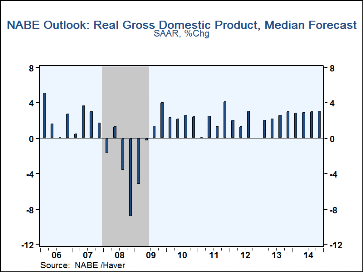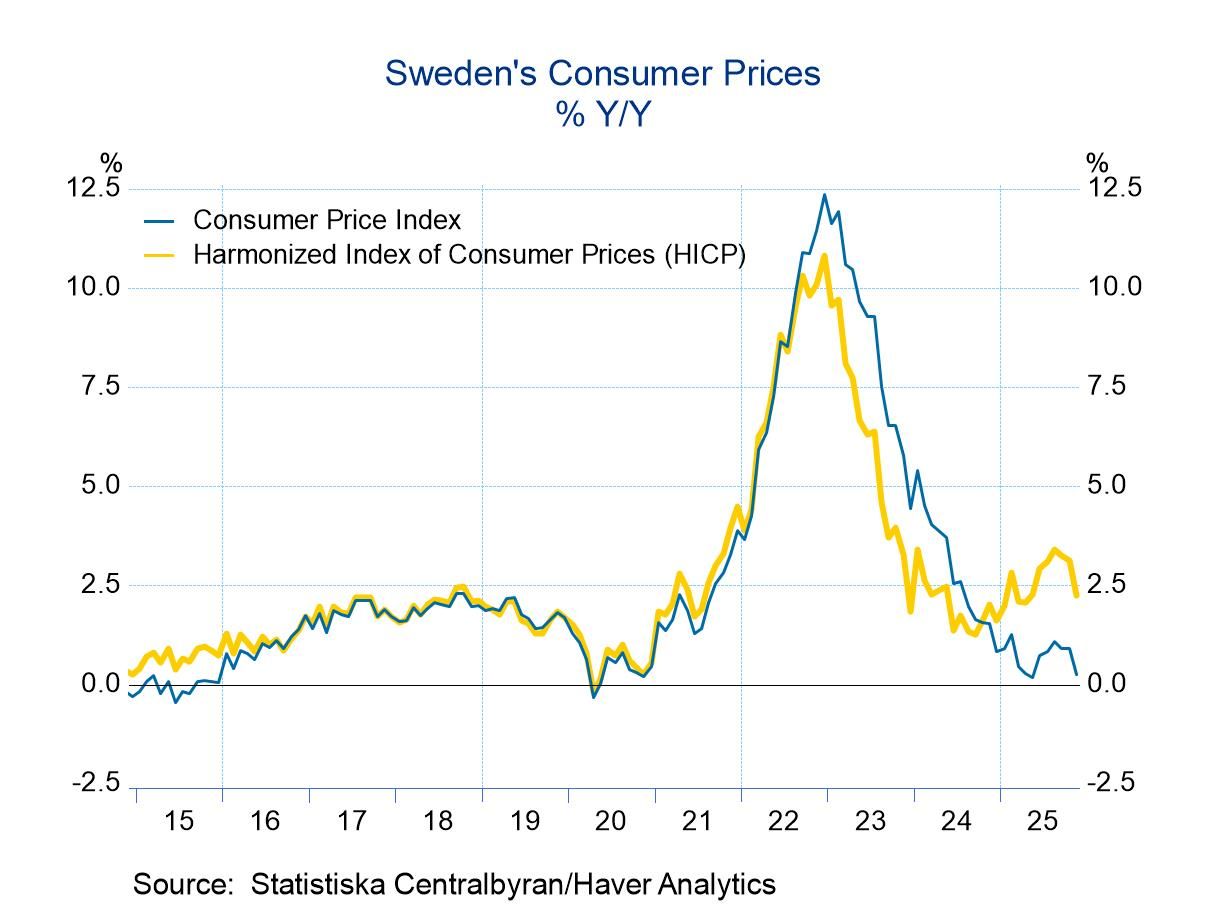 Global| Feb 25 2013
Global| Feb 25 2013Business Economists Forecast Economic Improvement in 2014
by:Tom Moeller
|in:Economy in Brief
Summary
Following a 2.0% rise this year, real growth in the U.S. economy is expected to improve to 2.8% in 2014. These are the projections for average real GDP growth by the members of the National Association for Business Economics. [...]
Following a 2.0% rise this year, real growth in the U.S. economy is expected to improve to 2.8% in 2014. These are the projections for average real GDP growth by the members of the National Association for Business Economics. Quarterly growth is expected to improve to 3.0% by the end of this year and hover there through 2014. Growth in consumer spending is seen rising to 2.5% next year after a steady 1.9% advance in 2013. Growth in business investment in both structures and producers' durable equipment is forecast to improve.
Housing starts are forecast to continue their upward advance and average 0.98 mil. this year and 1.15 mil. in 2014. Expected light vehicle sales also should improve, first to 15.2 mil. then to 15.7 mil., their highest since 2007. Payroll employment growth is expected to average a firm 193,000 per month next year with the unemployment rate falling to an average 7.0% by yearend 2014. The forecast for a 2.1% rise in consumer prices next year is steady. To the upside, however, expectations for the core PCE price index is for growth of 2.0% by the end of next year, up from the quarterly low of 0.9% at the end of 2012.
Recent improvement in the bond market is expected to end with continued economic growth. The forecasted 2.75% interest rate on 10-year Treasury notes at the end of next year accompanies stable short-term rates. Corporate profits should rise an only moderate 6.9% next year with growth still well-below the 23.2% gain in 2010 and 11.4% growth in 2009 when the recovery first got going. Moderate economic growth is forecast to reduce the federal government budget deficit to $761 billion in 2014, well below its $1.4 trillion 2009 peak.
Detailed figures from the latest NABE report can be found in Haver's SURVEYS database.
The Economy and Monetary Policy: Follow the Demand is last week's presentation by John C. Williams, President & CEO of the Federal Reserve Bank of San Francisco and it is available here.| National Association For Business Economics | 2014 | 2013 | 2012 | 2011 | 2010 |
|---|---|---|---|---|---|
| Real GDP (% Chg. SAAR) | 2.8 | 2.0 | 2.2 | 1.8 | 2.4 |
| Personal Consumption Expenditures | 2.5 | 1.9 | 1.9 | 2.5 | 1.8 |
| Nonresidential Structures | 5.2 | 2.9 | 9.6 | 2.7 | -15.6 |
| Producers' Durable Equipment & Software | 6.7 | 5.7 | 6.9 | 11.0 | 8.9 |
| Residential Investment | 13.4 | 14.8 | 11.9 | -1.4 | -3.7 |
| Change in Real Business Inventories (Bil. $) | 40.0 | 39.9 | 44.6 | 31.0 | 50.9 |
| Real Net Exports (Bil. $) | -399.5 | -401.1 | -405.6 | -408.0 | -419.7 |
| Housing Starts (Mil. Units) | 1.15 | 0.98 | 0.78 | 0.61 | 0.59 |
| Light Vehicle Sales (Mil. Units) | 15.7 | 15.2 | 14.4 | 12.7 | 11.6 |
| Payroll Employment Avg. Monthly Change (000s) | 193 | 170 | 181 | 175 | 85 |
| Unemployment Rate (%) | 7.2 | 7.7 | 8.1 | 8.9 | 9.6 |
| Consumer Price Index (Y/Y %) | 2.1 | 2.0 | 2.1 | 3.1 | 1.6 |
| Fed Funds Rate (%, Year End) | 0.125 | 0.125 | 0.125 | 0.125 | 0.125 |
| 10-Year Treasury Note (%, Year End) | 2.75 | 2.25 | 1.78 | 1.89 | 3.30 |
Tom Moeller
AuthorMore in Author Profile »Prior to joining Haver Analytics in 2000, Mr. Moeller worked as the Economist at Chancellor Capital Management from 1985 to 1999. There, he developed comprehensive economic forecasts and interpreted economic data for equity and fixed income portfolio managers. Also at Chancellor, Mr. Moeller worked as an equity analyst and was responsible for researching and rating companies in the economically sensitive automobile and housing industries for investment in Chancellor’s equity portfolio. Prior to joining Chancellor, Mr. Moeller was an Economist at Citibank from 1979 to 1984. He also analyzed pricing behavior in the metals industry for the Council on Wage and Price Stability in Washington, D.C. In 1999, Mr. Moeller received the award for most accurate forecast from the Forecasters' Club of New York. From 1990 to 1992 he was President of the New York Association for Business Economists. Mr. Moeller earned an M.B.A. in Finance from Fordham University, where he graduated in 1987. He holds a Bachelor of Arts in Economics from George Washington University.










